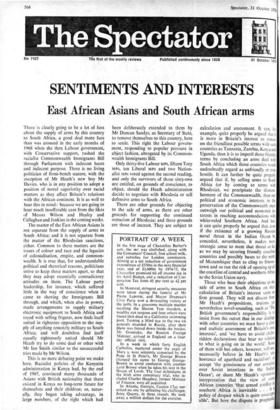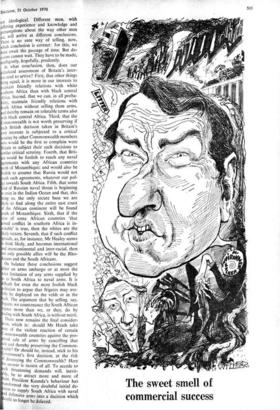SENTIMENTS AND INTERESTS
East African Asians and South African arms
There is clearly going to be a lot of fuss about the supply of arms by this country to South Africa, a good deal more fuss than was aroused in the early months of 1968 when the then Labour government, with Conservative support, rushed the racialist Commonwealth Immigrants Bill through Parliament with indecent haste and indecent purpose. There is no living politician of front-bench stature, with the exception of Mr Heath's new boy Mr Davies, who is in any position to adopt a position of moral superiority over racial matters as they affect Britain's relations with the African continent. It is as well to bear this in mind: because we are going to hear much insufferable cant from the likes of Messrs Wilson and Healey and Callaghan and Jenkins in the coming weeks.
The matter of the East African Asians is not separate from the supply of arms to South Africa; and it is not separate from the matter of the Rhodesian sanctions, either. Common to these matters are the issues of colour and race and the legacies of colonialisation, empire, and common- wealth. It is true that, for understandable political and rhetorical reasons, politicians strive to keep these matters apart, so that they may adopt essentially contradictory attitudes on them. The Labour party leadership. for instance, which suffered little in the way of conscience when it came to shoving the Immigrants Bill through, and which, when also in power, made arrangements to supply military electronic equipment to South Africa and toyed with selling frigates, now finds itself united in righteous opposition to the sup- ply of anything remotely military to South Africa; and will doubtless find itself equally righteously united should Mr Heath try to do some deal or other with Mr Ian Smith similar to the unsuccessful tries made by Mr Wilson.
This is no mere debating point we make here. Racialist policies of the Kenyatta administration in Kenya had, by the end of 1967, convinced many thousands of Asians with British nationality that there existed in Kenya no long-term future for themselves and their children; so, natur- ally, they began taking advantage, in large numbers, of the right which had been deliberately extended to them by Mr Duncan Sandys, as Secretary of State, to remove themselves to this country, here to settle. This right the Labour govern- ment, responding to popular pressure in abject fashion, abrogated by its Common- wealth Immigrants Bill.
Only thirty-five Labour MPS, fifteen Tory MPs, ten Liberal MPS and two Nation- alist MPs voted against the second reading, and only the survivors of those sixty-two are entitled, on grounds of conscience, to object, should the Heath administration decide to negotiate with Rhodesia or sell defensive arms to South Africa.
There are other grounds for objecting to the sale of arms, as there are other grounds for supporting the continued ostracism of Rhodesia; and these grounds are those of interest. They are subject to calculation and assessment. It can, for example, quite properly be argued that it is more in Britain's interest to remain on the friendliest possible terms with such countries as Tanzania, Zambia, Kenya and Uganda, than it is to imperil those friendly terms by concluding an arms deal with South Africa which those countries would undoubtedly regard as unfriendly or even hostile. It can further be quite properly argued that if, by selling arms to South Africa (or by coming to terms with Rhodesia), we precipitate the dismem- berment of the Commonwealth, then our political and economic interests in the preservation of the Commonwealth must outweigh our political and economic in• terests in reaching accommodations with white-ruled Southern Africa. And last, it can quite properly be argued that, even if the existence of a growing Russian naval threat in the Indian Ocean be conceded, nevertheless, it makes more strategic sense to meet that threat so hi as we may by securing friendly coastline countries and possibly bases to the north of Mozambique than to cling to Simons- town and so run the risk of opening up all the coastline of central and northern Africa to the Soviet Union navy.
Those who base their objections to the sale of arms to South Africa on their calculation of Britain's interest seem 011 firm ground. They will not dissent from Mr Heath's propositions, truisms }el nevertheless novel-sounding, such as '11$ British government's responsibility is to insist from the outset that in our dealing with other countries we must have a clear and realistic assessment of Britain's own interests', and 'we have to avoid cliche• ridden declarations that bear no relation to what is going on in the world'. Some of them will but others, however, will not' necessarily believe in Mr Heath's ‘alk horrence of apartheid and racialism': 0t accept 'the genuineness of our anxieties over Soviet intentions in the Indian Ocean'; or share Mr Heath's optimist"' interpretation that the view of so" African African countries 'that armed conflict $ southern Africa is inevitable . . • Is 1 policy of despair which is quite unaccel* able'. But here the dispute is pragin of ideological. Different men, with iffering experience and knowledge and resumptions about the way other men ct, will arrive at different conclusions. ere is no sure way of telling, now, hich conclusion is correct : for this, we ust await the passage of time. But de- isions cannot wait. They have to be made, telligently, hopefully, prudently. At what conclusion, then, does our lculated assessment of Britain's inter- ts tend to arrive? First, that other things ing equal, it is more in our interests to aintain friendly relations with white uthern Africa than with black central Erica. Second, that we can, in all proba- litv, maintain friendly relations with uih Africa without selling them arms, nd thereby remain on tolerable terms also ith black central Africa. Third, that the ommonwealth is not worth preserving if ach British decision taken in Britain's awn interests is subjected to a critical rutiny by other Commonwealth members ho would be the first to complain were ritain to subject' their such decisions to imilar critical scrutiny. Fourth, that Brit- in would be foolish to reach any naval ereements with any African countries orth of Mozambique; and would also be polish to assume that Russia would not each such agreements, whatever our pol- y towards South Africa. Fifth, that some .nd of Russian naval threat is beginning exist in the Indian Ocean and that, this ing so, the only secure base we are kely to find along the entire east coast if the African continent will be found uth of Mozambique. Sixth, that if the iew of some African countries 'that rmed conflict in southern Africa is in- vitable' is true, then the whites are the ely victors. Seventh, that if such conflict reads, as, for instance, Mr Healey seems think likely, and becomes international nd intercontinental and inter-racial, then ur only possible allies will be the Rho- esians and the South Africans.
On balance these conclusions suggest nher an arms embargo or at most the filet limitation of any arms supplied by s to South Africa to naval arms. It is fficult for even the most foolish black litician to argue that frigates may use- Ily be deployed on the veldt or in the ush. The argument that by selling, say, gates, we countenance the South African e,gme more than we, or they, do by ading with South Africa, is without merit. There now remains the final consider- ion, which is: should Mr Heath take etc of the violent reaction of certain ommonwealth countries against the pro- sed sale of arms by cancelling that le and thereby preserving the Common- ealth? Or should he, instead, stick to his overnment's first decision, at the risk destroying the Commonwealth? Here eanswer is easiest of all. To accede to h threatening demands will, inevit- bly, be to attract more and more of em. President Kaunda's behaviour has ansformed the very doubtful initial de- ision to supply South Africa with naval nd defensive as into a decision which ould no longer be delayed.
The sweet smell of commercial success











































 Previous page
Previous page